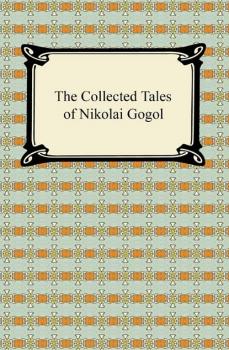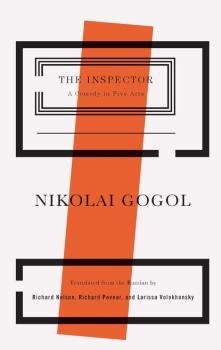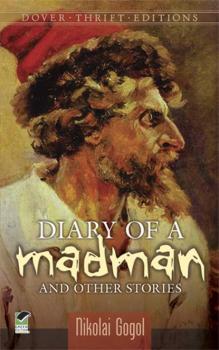ТОП просматриваемых книг сайта:
Николай Гоголь
Список книг автора Николай ГогольАннотация
Nikolai Vasilievitch Gogol, the Molière of Russia, was born in the sunny Ukraine in March, 1809, and died in Moscow forty-three years later. The author of Russia's famous national comedy, «The Inspector-General,» Gogol was the first dramatist of his country to write plays on the Western European model, even as his friend Pushkin was the first Russian poet to introduce the Western strain into the literature of his people. In the comedy «Marriage,» which Gogol began in 1832 as «The Wooers» and completed only in 1842 in its final form, the author attacked in his inimitable manner the modern problem of escape from marriage. By unexcelled, mirth-provoking characterization, and with delightful irony, Gogol satirized the fear of marriage inherent in the soul of the average man. «The Gamblers» is a masterpiece of dramatic suspense, and has been hailed in Europe as a model for plot development. With a few strokes, Gogol drew this set of characters whose purpose in life is so similar, yet whose manners are so individual. When «The Gamblers» was first produced in Berlin, it made a striking impression on the audience whose mystification was complete to the very end.
Аннотация
"Dead Souls" is the story of Chichikov, a young middle-class gentleman who comes to a small town with a dubious plan to improve his wealth and position in life. He begins by spending beyond his means on the premise that he can impress the local officials and gain standing and connections in the community that will give him the capacity to live easily into the future. At the heart of his plan is the idea of acquiring «dead souls» or more explicitly serfs of landowners who have died since the last census. Since the taxes of landowners are based upon the number of serfs that they employ, Chichikov believes that the landowners will be all too happy to part with these «dead souls». A satirical gem, Gogol's «Dead Souls» exemplifies his particular gift of exhibiting the true failings of humanity in all their absurdity.
Аннотация
Nikolai Gogol, an early 19th century Ukrainian-born Russian novelist, humorist, and dramatist, created some of the most important works of world literature and is considered the father of modern Russian realism. Gogol satirized the corrupt bureaucracy of the Russian Empire through the scrupulous and scathing realism of his writing, which would ultimately lead to his exile. Among some of his finest works are his short stories. Together in this collection are collected some of the best of these stories, they include the following: Old Fashioned Farmers, How the Two Ivans Quarrelled, The Nose, The Overcoat (The Cloak), St. John's Eve, The Night of Christmas Eve, The Mantle, The Diary of a Madman, The Viy, The Mysterious Portrait, The Fair of Sorotchinetz, An Evening in May, Mid-Summer Evening, and The Carriage (The Calash).
Аннотация
Nikolai Gogol, an early 19th century Ukrainian-born Russian novelist, humorist, and dramatist, considered the father of modern Russian realism, created some of the most important works of Russian literature. Gogol satirized the corrupt bureaucracy of the Russian Empire through the scrupulous and scathing realism of his writing, which would ultimately lead to his exile. Among some of his finest works are his short stories. A representative selection of Gogol’s short stories are presented in this volume. The following stories can be found herein: “The Fair of Sorotchinetz”, “St. John’s Eve”, “An Evening in May”, “Old-Fashioned Farmers”, “The Viy”, “The Night of Christmas Eve”, “How the Two Ivans Quarrelled”, “The Mysterious Portrait”, “The Diary of a Madman”, “The Nose”, “The Carriage”, and “The Overcoat”. This edition is includes a biographical afterword.
Аннотация
First published in 1842, “Dead Souls” is the story of Chichikov, a young middle-class gentleman who comes to a small town in Russia with a dubious plan to improve his wealth and position in life. He begins by spending beyond his means on the premise that he can impress the local officials and gain standing and connections in the community. At the heart of his plan is the idea of acquiring “dead souls” or more explicitly serfs of landowners who have died since the last census. Since the taxes of landowners are based upon the number of serfs that they employ, Chichikov believes that the landowners will be all too happy to part with these “dead souls”. Legend has it that Gogol supposedly produced a third part to the novel which he destroyed shortly before his death. Despite ending in mid-sentence and with portions from the second part which seem to be missing it is generally accepted that the novel is extant. A satirical gem, Gogol’s “Dead Souls” exemplifies his particular gift of exhibiting the true failings of humanity in all their absurdity. This edition is translated by C. J. Hogarth, includes an introduction by John Cournos, and a biographical afterword.
Аннотация
A revelatory new translation of Gogol’s comedy by renowned playwright Richard Nelson and Richard Pevear & Larissa Volokhonsky – the foremost contemporary translators of classic Russian literature including the best-selling Oprah’s Book Club selection, Anna Karenina – marks the first of a series of translations of important Russian plays over the next ten years.
Информация о книге
Автор произведения Николай Гоголь
Аннотация
Gogol's stories are admired for their skillful mingling of fantasy and reality, quiet good humor and use of mundane details — as Gogol put it — «to extract the extraordinary from the ordinary.» Imaginative and timeless, they remain as fresh and significant today as they were to readers generations ago.This rich selection of four short stories by the great 19th-century Russian author of Dead Souls includes «The Nose,» a savage satire of incompetent bureaucrats and the snobbery and complacency of the Russian upper classes; «Old-Fashioned Farmers,» a sketch depicting an elderly couple who live a happy but simple life in rustic seclusion; «The Tale of How Ivan Ivanovich Quarrelled with Ivan Nikiforovich,» and of Gogol's most famous comic stories; and «The Overcoat,» an exceptionally moving tale — considered a masterpiece of the form — about a poor and much-ridiculed St. Petersburg official. Includes a selection from the Common Core State Standards Initiative: «The Nose.»
Информация о книге
Автор произведения Николай Гоголь
Жанр Зарубежная классика
Серия Dover Thrift Editions
Аннотация
A stranger arrives in a Russian backwater community with a bizarre proposition for the local landowners: cash for their «dead souls,» the serfs who have died in their service and for whom they must continue to pay taxes until the next census. The landowner receives a payment and a relief of his tax burden, and the stranger receives — what? Gogol's comic masterpiece offers the answer in a vast and satirical painting of the Russian panorama, as it traces the path and encounters of its mysterious protagonist, Pavel Ivanovich Chichikov, in pursuit of his dubious scheme.The plot of Dead Souls is reputed to have been inspired by an actual episode related to the author by his friend, the poet Pushkin. Although intended as a three-part novel, only the first part and a few fragments of a draft of the second part exist; Gogol completed and destroyed the second part, and died in the course of his ascetic preparations for writing the third. Some readers consider his novel a realistic portrait of nineteenth-century Russia; others regard it as a work of great symbolism, proclaiming the trickster Chichikov an accurate image of commercial travelers the world over, whose success rests less upon their actual wares than on their grasp of human nature and powers of persuasion. Among the greatest nineteenth-century Russian novels, Dead Souls continues to inspire twenty-first century authors and readers.
Информация о книге
Автор произведения Николай Гоголь
Жанр Зарубежная классика
Серия Dover Thrift Editions
Аннотация
Hailed by Nabokov as «the greatest artist that Russia has yet produced,» Nikolai Gogol (1809-1852) left his mark as a playwright, novelist, and writer of short stories. Gogol's works remain popular with both writers and readers, who prize his originality, imaginative gifts, and sheer exuberance.This collection offers an excellent introduction to the author's works. Opening a door to his bizarre world of broad comedy, fantasy, and social commentary, the title story portrays a petty official's mental disintegration as he struggles for the attention of the woman he loves. Set during the repressive rule of Nicholas I, it satirizes the bureaucratic excesses of the era. Additional tales include «The Nevski Prospect,» a portrayal of the feverish pace of St. Petersburg street life, and «The Portrait,» a gripping depiction of a soul's perdition.
Информация о книге
Автор произведения Николай Гоголь
Жанр Зарубежная классика
Серия Dover Thrift Editions
Аннотация
One of the most famous comedies in world theatre, Gogol's masterpiece has lost none of its bite. In a small town corruption is rife, and the Mayor and his cronies have got it made. So when they learn they are going to be subject to an undercover government inspection they panic. Mistaking a penniless nobody for the inspector they swiftly fall victims to their own stupidity and greed.A dazzling blend of preposterous characters and familiar situations, Nabokov called The Government Inspector the greatest play in the Russian language. A production of this version of the play opened at the Chichester Festival in June 2005 starring the comedian Alistair McGowan.










